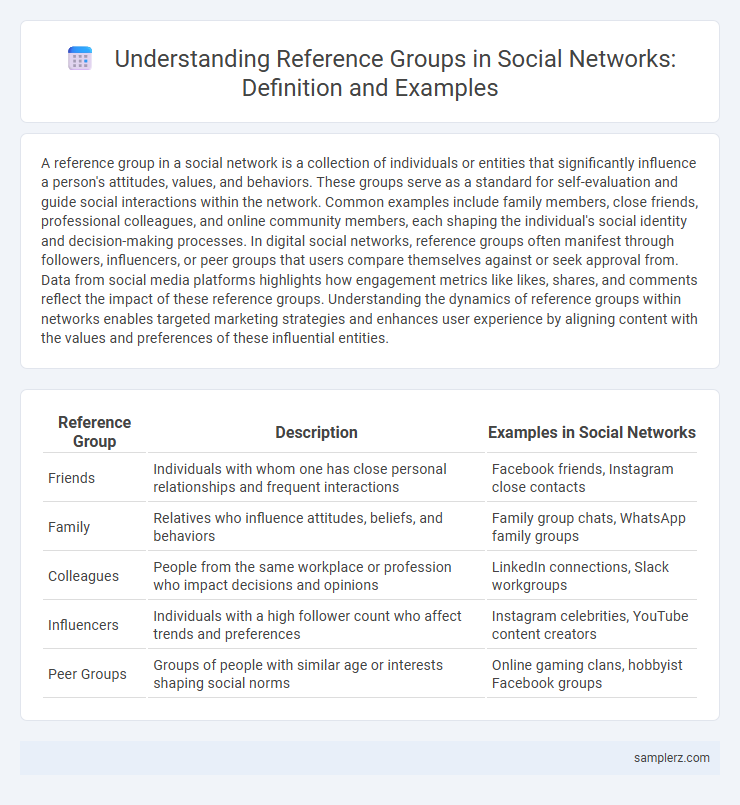A reference group in a social network is a collection of individuals or entities that significantly influence a person's attitudes, values, and behaviors. These groups serve as a standard for self-evaluation and guide social interactions within the network. Common examples include family members, close friends, professional colleagues, and online community members, each shaping the individual's social identity and decision-making processes. In digital social networks, reference groups often manifest through followers, influencers, or peer groups that users compare themselves against or seek approval from. Data from social media platforms highlights how engagement metrics like likes, shares, and comments reflect the impact of these reference groups. Understanding the dynamics of reference groups within networks enables targeted marketing strategies and enhances user experience by aligning content with the values and preferences of these influential entities.
Table of Comparison
| Reference Group | Description | Examples in Social Networks |
|---|---|---|
| Friends | Individuals with whom one has close personal relationships and frequent interactions | Facebook friends, Instagram close contacts |
| Family | Relatives who influence attitudes, beliefs, and behaviors | Family group chats, WhatsApp family groups |
| Colleagues | People from the same workplace or profession who impact decisions and opinions | LinkedIn connections, Slack workgroups |
| Influencers | Individuals with a high follower count who affect trends and preferences | Instagram celebrities, YouTube content creators |
| Peer Groups | Groups of people with similar age or interests shaping social norms | Online gaming clans, hobbyist Facebook groups |
Defining Reference Groups in Social Networks
Reference groups in social networks consist of individuals or collectives that influence a person's attitudes, values, and behaviors through direct or indirect interactions. Examples include peer groups, professional organizations, and online communities that serve as benchmarks for social comparison and identity formation. These groups shape decision-making processes and social norms within a networked environment.
Types of Reference Groups in Digital Communities
Reference groups in digital communities include aspiration groups, where users emulate influencers and celebrities; membership groups, such as online forums or social media networks where individuals share common interests; and dissociative groups, representing communities that users intentionally avoid to maintain their identity. These types play critical roles in shaping consumer behavior, social identity, and online interaction patterns. Platforms like Instagram, Reddit, and LinkedIn exemplify environments where these reference groups influence attitudes and decision-making processes.
The Role of Peer Groups in Online Social Influence
Peer groups in online networks serve as influential reference groups by shaping individuals' opinions, behaviors, and purchasing decisions through social validation and shared norms. Platforms like Instagram and TikTok amplify peer group impact by facilitating real-time interactions, content sharing, and feedback loops that reinforce conformity and trends. This dynamic fosters social influence cycles where peer endorsements significantly affect users' attitudes toward brands, political views, and lifestyle choices.
Family as a Reference Group in Virtual Networks
Family members act as a primary reference group within virtual networks, influencing opinions, behaviors, and decision-making processes through constant digital communication. Online family groups on platforms like WhatsApp, Facebook, or Instagram create a support system that reinforces shared values and social norms. This virtual interaction strengthens emotional bonds and provides a reliable source of advice and validation in social contexts.
Opinion Leaders as Reference Groups in Social Media
Opinion leaders in social media act as influential reference groups by shaping followers' attitudes and behaviors through trusted content and authentic engagement. These individuals often possess specialized knowledge or charisma that drives trends and consumer decisions within digital networks. Brands leverage opinion leaders to amplify messaging, creating ripple effects across diverse social media communities.
Professional Networks as Reference Groups
Professional networks serve as pivotal reference groups by influencing career decisions, skill development, and industry norms. Members often consult trusted peers within platforms like LinkedIn or industry-specific forums to benchmark job performance and professional growth. These networks provide social validation and critical feedback, shaping individual identity and workplace behavior.
Subcultures and Reference Groups in Online Spaces
Reference groups in online spaces often manifest through subcultures such as gaming communities, fitness forums, or fandom groups, where shared interests and values influence individual behavior and identity formation. These digital subcultures serve as powerful social reference groups by providing norms, language, and validation that shape users' perceptions and actions. The connectivity and constant interaction within these groups amplify their impact on personal and collective decision-making processes in the social network environment.
Aspirational Reference Groups in Social Platforms
Aspirational reference groups on social platforms include influencers, celebrities, and industry leaders whose lifestyles and achievements users admire and strive to emulate. These groups shape users' preferences, behaviors, and purchasing decisions by setting trends and providing social proof within digital communities. Brands leverage aspirational groups to enhance engagement and drive consumer loyalty through targeted collaborations and endorsements.
Reference Groups and Consumer Behavior in Networks
Reference groups in social networks, such as peer groups and opinion leaders, significantly influence consumer behavior by shaping preferences and purchase decisions. These groups provide normative guidance and comparison standards, impacting product adoption rates and brand loyalty within connected communities. Understanding the role of reference groups helps marketers target interventions and optimize network effects to drive consumer engagement and sales.
Reference Groups’ Impact on Online Identity Formation
Reference groups such as peer networks, influencers, and professional communities play a crucial role in shaping online identity formation by providing social norms and validation mechanisms. Interaction within these groups influences individuals' self-presentation strategies, aligning their online personas with group expectations to gain acceptance and social capital. This dynamic impacts users' content creation, platform engagement, and identity experimentation across social media environments.

example of reference group in network Infographic
 samplerz.com
samplerz.com